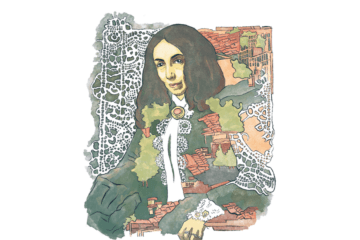Elizabeth Lund in The Christian Science Monitor:
 During her lifetime, Elizabeth Barrett Browning (1806-61) was widely regarded as Britain’s best female poet. Her groundbreaking work helped sway public opinion against slavery and child labor and changed the direction of English-language poetry for generations. Yet within 70 years of her death, Barrett Browning was no longer viewed as an international literary superstar but as an invalid with a small, couch-bound life. By the 1970s, critics described her as lacking the talent of her husband, Robert Browning, and hindering his writing. Fiona Sampson challenges those views in “Two-Way Mirror: The Life of Elizabeth Barrett Browning,” the first new biography of the poet in more than 30 years. Sampson, whose works include the critically acclaimed biography “In Search of Mary Shelley,” reframes Barrett Browning’s reputation by highlighting her development as a writer despite the many restrictions she faced in Victorian society.
During her lifetime, Elizabeth Barrett Browning (1806-61) was widely regarded as Britain’s best female poet. Her groundbreaking work helped sway public opinion against slavery and child labor and changed the direction of English-language poetry for generations. Yet within 70 years of her death, Barrett Browning was no longer viewed as an international literary superstar but as an invalid with a small, couch-bound life. By the 1970s, critics described her as lacking the talent of her husband, Robert Browning, and hindering his writing. Fiona Sampson challenges those views in “Two-Way Mirror: The Life of Elizabeth Barrett Browning,” the first new biography of the poet in more than 30 years. Sampson, whose works include the critically acclaimed biography “In Search of Mary Shelley,” reframes Barrett Browning’s reputation by highlighting her development as a writer despite the many restrictions she faced in Victorian society.
As a child, Elizabeth Barrett – called “Ba” by her parents and 11 siblings – defied expectations. She penned her first poems at the age of 8 and began reading Homer, Shakespeare, and Milton, guided by her mother. For her 14th birthday, her father paid to have 50 copies printed of “The Battle of Marathon,” a 1,500-line moral tale she wrote in heroic couplets.
Her life changed profoundly a year later when she developed an illness that doctors tried to treat with prolonged bed rest and dangerous remedies, including opium. Despite her confinement, which would continue for most of her life, the young poet’s writing flourished. Her work was published, drawing the attention of two male mentors. One, like her father, encouraged her talent as well as submissive dependency on his guidance and approval.
More here.
